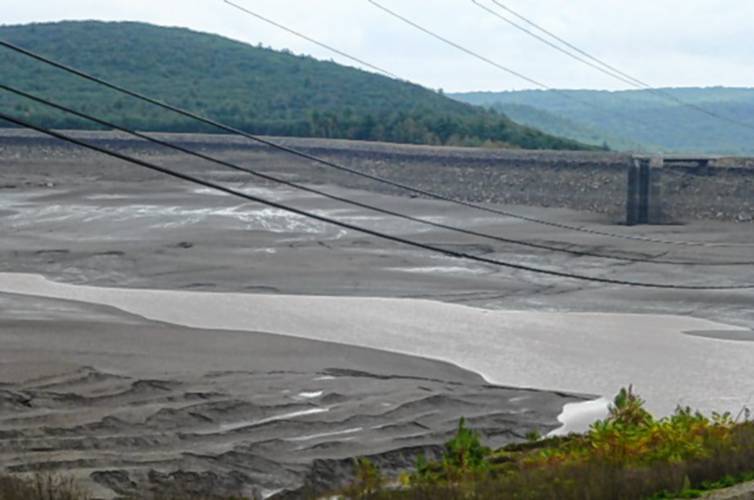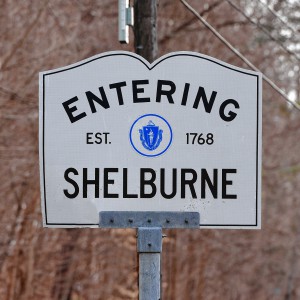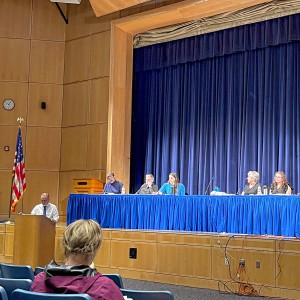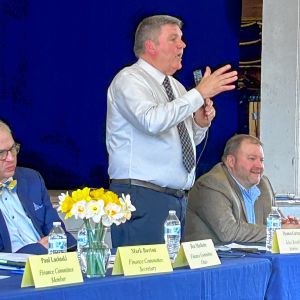My Turn: With pump station down, Connecticut River back to life

Northfield Mountain Pumped Storage Reservoir sits empty of water on Sept. 26, awaiting removal of tons of silt and detritus sucked up with river water during operations. PHOTO BY KARL MEYER
| Published: 11-16-2023 5:31 PM |
For the first season since 2010, the Connecticut River in Massachusetts has come back to life.
FirstLight Power’s Northfield Mountain Pumped Storage Station shut down just as summer ended. For a brief season, the disastrously broken river ecosystem in the 20 miles between the Turners Falls and Vernon Vermont dams is getting life-giving oxygen.
For eight weeks the river has ceased being halted and regularly suctioned into reverse by punishing, chaotic industrial flows in direct violation of the Clean Water Act since Northfield’s reversing turbines first plugged into the power grid in 1973, wreaking havoc on New England’s critical aquatic artery.
On Sept. 26, Northfield’s giant reservoir sat emptied of its stilled, denatured river water — about 5.6 billion gallons worth. What remained were desert-like acres where up to 30,000 cubic square yard banks of the silt and detritus its turbines dredged in were slated for removal. It’s suction that annually eviscerates millions of the ecosystem’s juvenile fish, eggs and larvae from a suite of over two dozen species in the river corridor spanning parts of southern New Hampshire, Vermont and northern Massachusetts.
The last time the river revived here was 2010. Back then, Northfield sat broken and inoperable for over six months, ultimately sanctioned and ordered offline by the EPA from May to November for flagrant violations of the Clean Water Act. FirstLight got caught secretly dumping up to 45,000 cubic square yards of Northfield’s sucked-in silt and muck directly back into the Connecticut River.
I notified Gary Sanderson at the Recorder, and alerted Daily Hampshire Gazette readers to that secret shutdown via an op-ed reservoir photo late that June. Without Northfield’s disruption that year, spring upstream passage of American shad at Turners Falls surged by 600% above the decade’s averages. Today, the brutal daily suck and flush has briefly abated again.
Since 1973, Northfield’s anti-gravity operations have been allowed to erase a river’s natural flow in a buy-low/sell high, suction-and-regenerate profit model. It formerly ran by plugging into the grid and powering up on excess, cheap night energy from the Vermont Yankee nuclear plant. Since Vermont Yankee’s closure in 2010, it’s been run on virgin energy from a grid primarily running on climate-scorching natural gas.
Northfield has been down for weeks and no one’s noticed, or gone without electricity. Largely a gas-powered contraption, most don’t know it is a net consumer from ISO-New England’s power grid. In a May 11, 2023 reply to Federal Energy Regulatory Commission questions, FirstLight reported it takes 34% more energy to pump out the river than it regenerates.
Article continues after...
Yesterday's Most Read Articles
 Bridge of Flowers in Shelburne Falls to open on plant sale day, May 11
Bridge of Flowers in Shelburne Falls to open on plant sale day, May 11
 Serious barn fire averted due to quick response in Shelburne
Serious barn fire averted due to quick response in Shelburne
 $12.14M school budget draws discussion at Montague Town Meeting
$12.14M school budget draws discussion at Montague Town Meeting
 As I See It: Between Israel and Palestine: Which side should we be on, and why?
As I See It: Between Israel and Palestine: Which side should we be on, and why?
 Greenfield homicide victim to be memorialized in Pittsfield
Greenfield homicide victim to be memorialized in Pittsfield
 ‘We are among the leaders’: Ashfield Town Meeting voters pass bevy of clean energy proposals
‘We are among the leaders’: Ashfield Town Meeting voters pass bevy of clean energy proposals
This shutdown not only gives life and flow back to a broken river, it’s stopped heating the planet and chewing through virgin energy. The 34% of energy lost annually pulling the river backward cancels out over half the virgin hydropower produced yearly by FirstLight’s Turners Falls hydro units.
Today, 5-foot daily tides are not ratcheting the river up and down at Turners Falls dam. Some reach 9 feet. In Gill, Montague and Northfield, the three-plus miles of river, at times wrenched to a dead stop and literally reversed via massive, anti-gravity suction, has ended. Hundreds of thousands of the year’s juvenile fish won’t be inhaled and lost to the river. And see-sawing artificial cycles here causing daily 6,000 cubic foot per second flow swings have calmed by half.
A river’s natural gravitational essence has returned; a long-alienated Connecticut River has been partially made whole again.
Sadly, the revival won’t last. FirstLight has notified FERC they expect to restart pumping before year’s end. If there were environmental justice, the river would never have been abandoned these last 50 years. Operating outside the Clean Water Act, it should never have been allowed startup in 1973.
At minimum, its brutality should have kept it closed had agencies and the NGOs encumbered with public river protection responsibility taken appropriate action in that EPA-ordered shutdown in 2010. Certainly, justice would have required it to close after April 30, 2018, the day its antique 1967 federal license expired.
Yet the ecosystem nightmare appears slated to continue for a new half-century. On March 31, 2023, key agencies and not-for-profits including the U.S. Fish & Wildlife Service, National Marine Fisheries Service, MA Fish and Wildlife, The Nature Conservancy and American Rivers signed off on a FirstLight comprehensive settlement agreement to have the Federal Energy Regulatory Commission relicense savage cycles first experienced on the Connecticut in 1973 — until at least 2073.
They promised to defend FirstLight’s proposed impacts counter to the Clean Water Act’s intent “to restore and maintain the chemical, physical and biological integrity of the Nation’s waters.” They’ve promised to support and defend a corporate proposal that re-sanctions year-round killing and the grim miles of a Connecticut River halted and sucked backward, against legal challenges.
A river, forced to run counter to its essence and consume its own young, is no longer a river at all. An ecosystem divided against itself cannot function.
Karl Meyer of Greenfield is a member of the Society of Environmental Journalists.

 Guest columnist Gene Stamell: We know what we know
Guest columnist Gene Stamell: We know what we know Michelle Caruso: Questions candidate’s judgment after 1980s police training incident
Michelle Caruso: Questions candidate’s judgment after 1980s police training incident Kathy Sylvester: Vote for expertise on May 6
Kathy Sylvester: Vote for expertise on May 6 Shirley and Mike Majewski: Vote for Blake Gilmore
Shirley and Mike Majewski: Vote for Blake Gilmore
